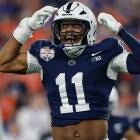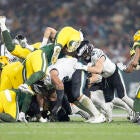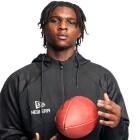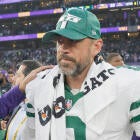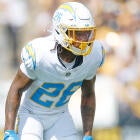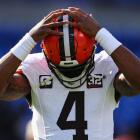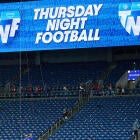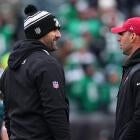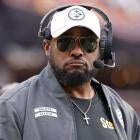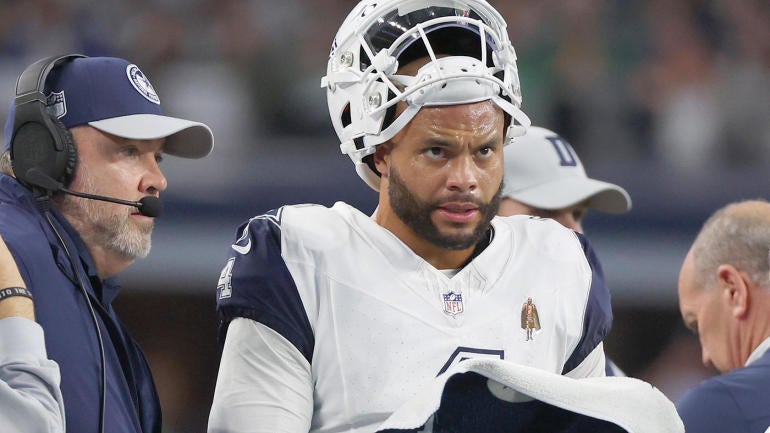
Welcome to the second edition of NFL Thursday Thoughts, a series of nine questions to take us through the remainder of the offseason, up until the Chiefs and Ravens kick off the 2024 regular season Sept. 5. Each edition will be a deep dive on a major NFL storyline this season, whether it be regarding teams, players, the league as a whole or some combination of the three.
Last week, we hit on Caleb Williams and the new-look Chicago Bears. This week, we look at a team that's been together for a long time but might be near the end of its current era: the Dallas Cowboys.
Jerry Jones isn't hard to find. He talks after games. He talks in the offseason. If you want to know what's going on with his Cowboys, he'll give it to you, often without mincing words. And those words carry weight.
So Jones created headlines last February when he insinuated he wasn't willing to load up for a single run at a Super Bowl. Almost exactly a year later, he changed his tone, saying, "we will be going all in" in 2024. Nearly two months later, Jones backtracked, saying his team will "get it done with less."
Actions, as it turns out, speak louder than words. Dallas was 29th in cash spending in 2022 and 10th last year. It is currently dead last this season after a quiet offseason, marking the fifth time in Dak Prescott's nine seasons that the Cowboys rank in the bottom half of the league in spending.
This year's approach is particularly baffling and will be the focus of this piece. But a history lesson is required first, and it's fitting that it's coming in Prescott's final season under contract.
The Cowboys have bungled the Prescott negotiations for, incomprehensibly, a second time. Dallas failed to get a Prescott extension done during and after his rookie contract, resulting in a franchise tag in 2020 and the highest cap number ($31.4 million) of any player.
Only then did Prescott get a four-year, $160 million contract. This year, he carries a cap hit of over $55 million. Only one player counts for more: Deshaun Watson, who, from a team perspective, has the worst contract in the sport. Overall, Prescott has counted $151 million against the cap over the last five years, an astronomical number. It's roughly $22 million more than the closest quarterback who has stayed with his team in Kirk Cousins, $23 million more than Matthew Stafford and $28 million more than Patrick Mahomes. Only Russell Wilson has cost more, and that's because the Broncos cut him to get his money off the books ASAP.
Instead of extending Prescott and being able to spread that cap hit out, the Cowboys are not only giving Prescott an enormous amount of money, but all the leverage in the world. After yet another offseason waffling between will they, won't they, the Cowboys are prepared to play with fire -- and get burned -- by letting Prescott play this season without an extension. He will get a massive payday next offseason. Maybe it's from the Cowboys. If it's not, Dallas will be left completely empty-handed. There'd be no real backup plan, other than starting over at the most important position in sports.
Prescott is not the only big contract coming due. CeeDee Lamb and Micah Parsons are also extension eligible. Lamb skipped OTAs and mandatory minicamp and isn't expected to show up for training camp without a new deal; Parsons skipped OTAs, but showed up for minicamp. Of course, the Cowboys paying one of Prescott, Lamb or Parsons would have a chain reaction, and with wide receivers getting more expensive this offseason, Dallas has backed itself into a corner with its two biggest offensive stars while also not yet taking care of its biggest defensive star.
And that is how we get here:
Is this the Cowboys' last run as we've known them? And, if so, is it good enough to get over their perplexing playoff hump?
To be fair, "as we've known them" is very good. Since entering the NFL, Prescott has played double-digit games seven times. In those seven seasons, only the Chiefs have a better regular-season record. Just last season, Prescott finished second in MVP voting, led the league in passing touchdowns and, going by expected points added per dropback, had the best year of his career. Lamb set franchise records in receptions (135) and yards (1,749). Parsons posted the best pressure rate in the NFL (21.8%) and had a career-high 14 sacks.
Outside of that "Big Three," Dallas unearthed a gem in DaRon Bland, who set an NFL record with five pick sixes and led the league with nine interceptions overall. Even though his sack total was down, DeMarcus Lawrence's pressure rate was consistent with his recent numbers. Jake Ferguson looks like a mainstay at tight end after breaking out. Brandon Aubrey ended Dallas' kicking woes.
And yet it was more of the same in the playoffs. In fact, it was worse. Like previous defeats, Prescott sputtered. Unlike previous defeats, the defense got gashed through the air and on the ground, and it wasn't to the 49ers, a matchup nightmare (which we'll get into), but to the much younger, cheaper Packers -- in Dallas, no less.
The Cowboys became the first No. 2 seed to lose a wild card game. Using expected points added, Prescott's two interceptions cost over 13 points alone. That ranked 230th out of 236 individual playoff games over the past decade. The defense allowed 7.7 yards per play, the franchise's second most in a playoff game. It was a disaster.
There's no easy explanation for Prescott's playoff struggles. They are what they are, and that's how he will be measured, no matter the heights he reaches in the regular season. Prescott, Lamb, Ferguson and Brandin Cooks are back. Despite some shuffling, Dallas still has one of the league's best offensive lines. While they might not reach the historic heights of 2023, the Cowboys should be very good offensively, and we'll see where they go from there.
The defense, meanwhile, could look very different. Out is Dan Quinn, the high-energy, free-wheeling defensive coordinator, now Washington's head coach. In is Mike Zimmer, a no-nonsense, throwback defensive mind -- quite the opposite of Quinn.
Last year, Quinn oversaw one of the best defenses in the league because it was one of the most disruptive. But, down-to-down, it wasn't nearly as effective.
Cowboys defense last season
| THE GOOD | THE BAD |
| 45% pressure rate (1st in NFL) | 48.6% rushing defense success rate (32nd in NFL) |
| 3.3% Int Pct (4th in NFL) | 80% goal-to-go TD pct (27th in NFL) |
| 14.6% TD rate (4th in NFL) | 57.8% defensive success rate (24th in NFL) |
| 84.3 expected points added (6th in NFL) | 1.6 yards per carry before contact (23rd in NFL) |
Expected points added is aided by big, game-changing plays, like all the turnovers and sacks the Cowboys racked up. But success rate -- in which every play counts the same -- is much different. If a defense gives up a 10-play, 90-yard drive, but gets an interception on the final play of that drive, its expected points added will be much, much better than its success rate.
Quinn gave his defenders plenty of freedom to roam and create confusion. Parsons, for example, averaged multiple snaps per game at six different spots: outside left end, left outside linebacker, right outside linebacker, right outside end, middle linebacker and left inside linebacker.
The Cowboys could do this because they put a ton of versatile, athletic players on the field, the sort of "tweener" body type that's becoming ever more popular because they can hypothetically run and cover first and, ideally, fit the run enough.
Dallas took it to an extreme. It played dime defense (six defensive backs) on 60.4% of its snaps, not only the highest rate on record (since 2007) but a massive, massive outlier in present-day football. Last year, the Steelers played the second-most dime at ... 23.2%.
That's how the run-heavy 49ers have been such a thorn in the Cowboys' side and how Aaron Jones rolled up 118 yards rushing and three touchdowns in last year's playoff game. The Cowboys, physically, were a small defense without enough players inclined to stop the run.
That will change under Zimmer -- the tendencies, the personnel groupings, the types of players. During Zimmer's time as Vikings head coach (2014-21), Minnesota played the least dime (1.1%) in the NFL while playing the second-most nickel (five defensive backs).
One of Dallas' few external free agents this offseason was linebacker Eric Kendricks, who played under Zimmer in Minnesota and would have been Dallas' top-graded front-seven run defender last year. He's also 232 pounds, 27 pounds heavier than one of last year's primary linebackers, Markquese Bell, who figures to play more safety. Furthermore, expect more Mazi Smith, the 337-pound defensive tackle who struggled as a first-round rookie last year.
It will be a big, big change -- one that might take some getting used to, especially for Parsons and Zimmer, who hasn't been in the NFL in any capacity since 2021. The players will have to adapt to his scheme. He'll have to adapt his deep-rooted scheme to his players. The result, Dallas hopes, is a defense that still has enough pass-rushing and secondary talent to create havoc but also enough heft and discipline to stand up to the league's most physical teams. It's a fine needle to thread.
So that's what Dallas will look like: A star quarterback going into his last year, a disgruntled star wide receiver, a superstar defender adapting to a new system, a solid amount of high-end talent around them -- especially on defense with Parsons, Bland and Trevon Diggs -- and a whole lot of pressure. Is it conducive to the team's first conference title game appearance in 30 seasons? It's hard to know.
Using consensus odds, the 49ers, Lions and Eagles all have shorter Super Bowl odds than the Cowboys (who are tied with the Packers) in the NFC. Dallas' offseason of discontent led to relatively few upgrades compared to other teams. Could Dallas have been more aggressive at running back, wide receiver and run defense? Sure, perhaps if Jerry Jones was truly "all in" on maxing out every possible avenue for a title. But he's not.
The Cowboys, plainly, are in win-now mode without having the best win-now roster they could. That doesn't mean they can't win, and win big. If Prescott exorcises playoff demons, anything can happen. But they're making an awfully big bet on a lot going right, or else things could go very, very wrong within a few months.
The Cowboys are always a must-watch show, part sports, part drama, part mystery. This year will be no exception, and the stakes are arguably higher than they've ever been.
![[object Object] Logo](https://sportshub.cbsistatic.com/i/2020/04/22/e9ceb731-8b3f-4c60-98fe-090ab66a2997/screen-shot-2020-04-22-at-11-04-56-am.png)











